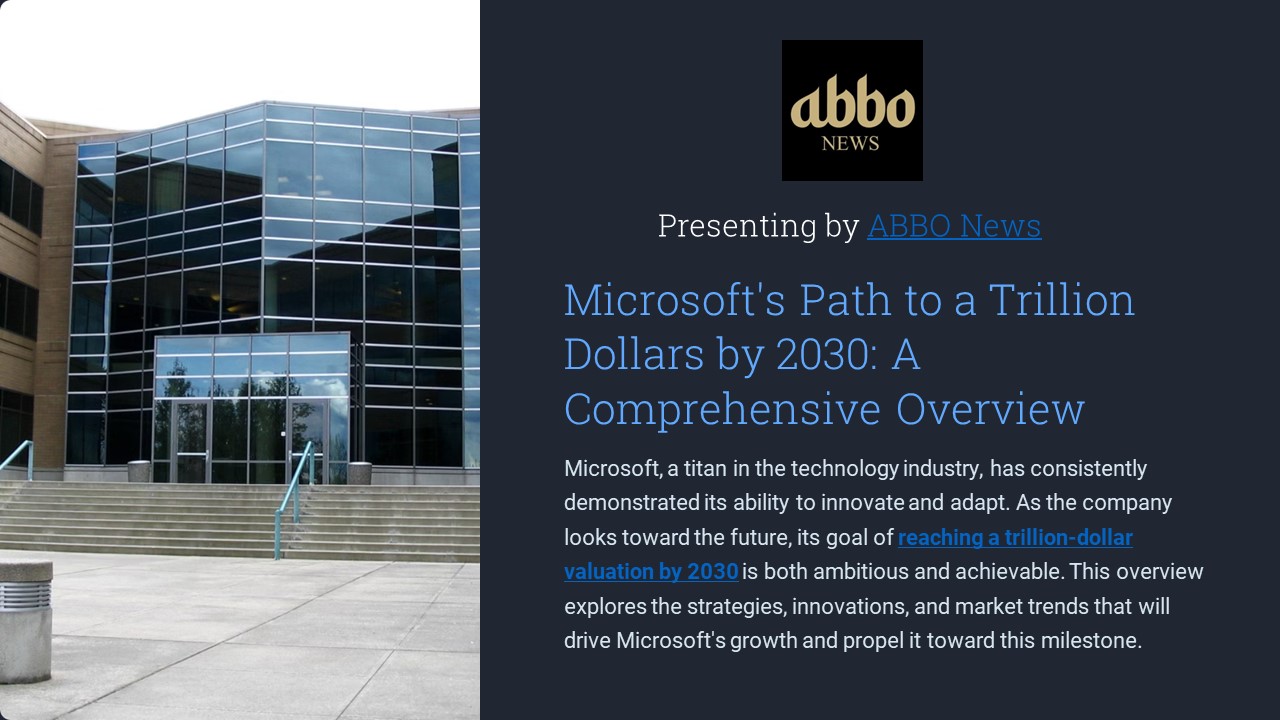Can Microsoft reach a trillion dollars by 2030?
Title:
Can Microsoft reach a trillion dollars by 2030?
Description:
Its goal of reaching a trillion-dollar valuation by 2030 is both ambitious and achievable. This overview explores the strategies, innovations, and market trends that will drive Microsoft's growth and propel it toward this milestone. –
Number of Views:3
Title: Can Microsoft reach a trillion dollars by 2030?
1
Presenting by ABBO News
Microsoft's Path to a Trillion Dollars by 2030 A
Comprehensive Overview
Microsoft, a titan in the technology industry,
has consistently demonstrated its ability to
innovate and adapt. As the company looks toward
the future, its goal of reaching a
trillion-dollar valuation by 2030 is both
ambitious and achievable. This overview explores
the strategies, innovations, and market trends
that will drive Microsoft's growth and propel it
toward this milestone.
2
A Legacy of Innovation
Windows Operating System
1
Launched in 1985, Windows became the foundation
of personal computing, dominating the market and
setting new standards for user-friendly
interfaces.
Microsoft Office Suite
2
Introduced in 1990, the Office suite of
productivity applications became essential for
businesses worldwide, cementing Microsoft's role
in enterprise software.
Azure Cloud Platform
3
Launched in 2010, Azure has rapidly grown to
become a leading cloud services platform, driving
significant revenue and positioning Microsoft as
a major player in cloud computing.
3
Strengths and Competitive Advantages
Cloud Computing The Power of Azure
Productivity and Business Processes
Artificial Intelligence and Machine Learning
Azure, Microsoft's cloud computing platform, is a
major growth driver. Competing directly with
Amazon Web Services (AWS) and Google Cloud, Azure
offers a comprehensive suite of services
including infrastructure as a service (IaaS),
platform as a service (PaaS), and software as a
service (SaaS). Azure's rapid growth is fueled by
its enterprise-grade solutions, extensive global
network, and integration with Microsoft's
existing enterprise products.
Microsoft's Office 365, now branded as Microsoft
365, continues to be a cornerstone of its
business. The transition to a subscription-based
model has provided a steady stream of recurring
revenue. Additionally, Microsoft's Dynamics 365
suite of enterprise resource planning (ERP) and
customer relationship management (CRM) solutions
further strengthens its position in the
enterprise market.
Microsoft's investments in artificial
intelligence (AI) and machine learning are key to
its future growth. AI is integrated across its
product portfolio, from Azure's AI services to
the intelligent features in Microsoft 365. The
acquisition of AI companies and the development
of proprietary AI technologies underscore
Microsoft's commitment to leading in this
transformative field.
4
Gaming and Entertainment
Expanding the Xbox Ecosystem
Strategic Acquisitions
The gaming division, centered around the Xbox
ecosystem, is another significant growth area.
With the expansion of Xbox Game Pass and the
integration of cloud gaming through Xbox Cloud
Gaming (formerly Project xCloud), Microsoft is
poised to capture a larger share of the gaming
market.
Strategic acquisitions, such as the purchase of
ZeniMax Media, the parent company of Bethesda,
enhance Microsoft's game development capabilities
and content library. These investments strengthen
the Xbox ecosystem and provide exclusive game
titles to attract and retain gamers.
5
Financial Performance and Market Valuation
Revenue Growth
Profit Margins
1
2
Microsoft has achieved consistent revenue growth,
with its cloud and subscription services leading
the charge.
High-profit margins reflect Microsoft's efficient
operations and premium product offerings.
Market Capitalization
3
Microsoft's market capitalization has approached
the trillion-dollar mark, reflecting investor
confidence in its long-term growth prospects.
6
Expanding Cloud Services
Cloud Infrastructure
1
Continued investment in Azure is paramount.
Microsoft aims to expand its cloud
infrastructure, enhance AI capabilities, and
develop industry-specific solutions.
Partnerships
2
Partnerships with leading enterprises and
government agencies will further bolster Azure's
adoption and growth.
7
Embracing AI and Innovation
Investments in RD
Strategic Acquisitions
Microsoft is committed to advancing AI and
innovation across its product lines. Investments
in research and development will drive the
integration of AI across its portfolio.
Strategic acquisitions of AI companies will
further enhance Microsoft's AI capabilities and
strengthen its position in the rapidly evolving
AI landscape.
Ethical AI Development
The focus on ethical AI development and
transparent AI practices will enhance Microsoft's
reputation and trust with customers.
8
Enhancing Productivity Solutions
Collaboration
Analytics
Automation
The evolution of Microsoft 365 will continue,
with new features and integrations aimed at
increasing productivity and collaboration.
The integration of AI-driven tools and advanced
analytics will add value to enterprise customers,
helping them make data-driven decisions.
Intelligent automation features within Microsoft
365 will streamline workflows and enhance the
user experience for businesses.
9
Strengthening the Gaming Ecosystem
Exclusive Game Titles
Microsoft's focus on developing and acquiring
exclusive game titles will be a key driver in
attracting and retaining gamers within the Xbox
ecosystem.
Cloud Gaming Services
The expansion of cloud gaming services, such as
Xbox Cloud Gaming, will provide gamers with
seamless access to a vast library of games across
multiple devices.
Community Engagement
A strong community engagement strategy, including
features like Xbox Game Pass and cross-platform
play, will foster a loyal and engaged gaming
audience.
10
Challenges and Risks
Competition in Cloud Computing
The cloud computing market is highly competitive,
with AWS and Google Cloud as formidable rivals.
Maintaining Azure's growth trajectory will
require continuous innovation and competitive
pricing.
Regulatory and Legal Challenges
As a global technology leader, Microsoft is
subject to regulatory scrutiny and potential
legal challenges. Compliance with data privacy
laws, antitrust regulations, and other legal
requirements is crucial.
Technological Disruption
The technology landscape is rapidly evolving, and
Microsoft must stay ahead of emerging trends and
potential disruptions. Investing in new
technologies and maintaining a culture of
innovation are essential to staying competitive.































